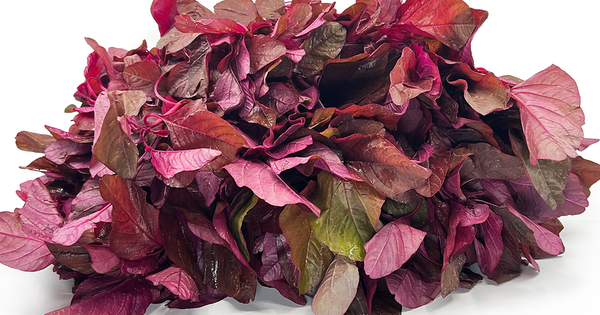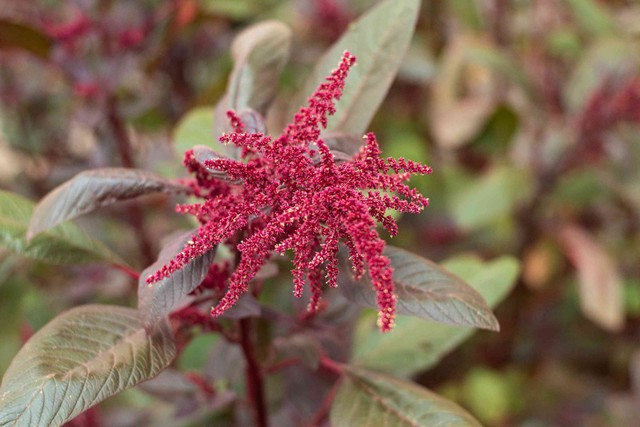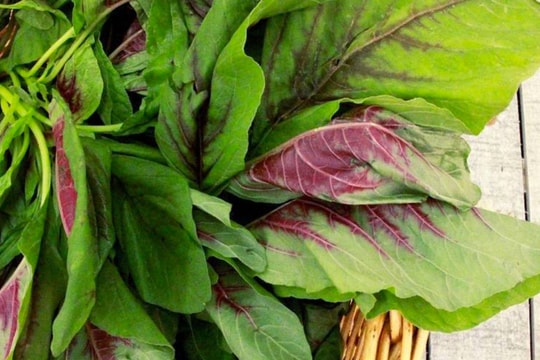Amaranth, 'super' protein but who should not eat it?
A bunch of amaranth costs only a few thousand dong, but the nutritional value of amaranth is very special for health. However, this vegetable is not suitable for a group of people.
Both the seeds and leaves are very nutritious, with the vitamin and mineral content of the leaves being quite similar to spinach. Amaranth seeds are a complete protein and are gluten-free.
A 2017 review published in the Journal of Food Research and Molecular Nutrition found that the proteins found in amaranth are of exceptionally high nutritional quality due to their superior balance of essential amino acids. Additionally, the phytochemicals found in amaranth contribute to its anti-inflammatory and antioxidant effects, as well as its numerous health benefits.

1. Nutritional benefits of amaranth
Amaranth is known for its exceptional nutritional profile, containing high levels of protein, fiber, and many essential vitamins and minerals. Thanks to its essential amino acids, amaranth is a complete protein source. Amaranth is also rich in iron, magnesium, phosphorus, and potassium.
According to a study by Coelho et al. in 2018, amaranth seeds also have high nutritional value because they have a balanced amino acid composition, especially lysine and methionine, which are often lacking in other cereals. Furthermore, they can produce bioactive peptides during digestion in the gastrointestinal tract, which is beneficial to human health.
Amaranth protein is considered a complete protein that is gluten-free and has a balanced amino acid profile. Amaranth protein is rich in bioactive peptides and its hydrolysates have been shown to have potential in preventing several diseases such as cardiovascular disease, cancer, and diabetes. Amaranth protein is rich in albumin, glutenin, and globulin, but the albumin and glutenin content varies depending on the geography and variety of amaranth.
In the food industry, amaranth protein is currently used in nutritionally fortified foods, gluten-free foods, and food protein films. Due to its excellent nutritional and functional properties, amaranth protein has shown great potential in functional foods and meat-like products.
Amaranth is not only nutritious but also naturally gluten-free, making it a great choice for those on restrictive diets. Its high fiber content helps aid digestion and promotes a healthy gut. Amaranth is also a good source of antioxidants, which help protect against oxidative stress and inflammation.
In addition, amaranth oil is a rich source of unsaturated fatty acids and valuable antioxidants. Amaranth seeds are a source of iron, which is important for preventing anemia.

Amaranth is very nutritious, below is the approximate nutritional content for 100 g of cooked amaranth:
Calories: 102 Protein: 3.8 g Carbohydrates: 19.7 g Fiber: 2 g Fat: 1.6 g Calcium: 159 mg Iron: 2.1 mg Magnesium: 65 mg Phosphorus: 140 mg Potassium: 135 mg Vitamin C: 1.9 mg Folate: 82 micrograms Small amounts of vitamins A and K.
2. Who should not eat amaranth?
Note, amaranth is high in protein so do not eat too much in one meal to avoid discomfort and bloating.
According to general practitioner Bui Dac Sang (Vietnam Academy of Science and Technology, Hanoi Oriental Medicine Association), the following groups of people should not eat amaranth:
People with cold constitution
Amaranth is cold, so people with cold constitutions who eat amaranth can increase the risk of diarrhea, cold stomach, stomachache, affecting their health.
People with chronic diarrhea, people with loose stools
Amaranth is cold in nature and can increase diarrhea and loose stools.
People with kidney stones, gout
Amaranth contains a compound that can combine with calcium in the body to form kidney stones, making kidney stones worse.
In addition, oxalic acid also hinders the absorption of calcium and zinc, affecting bone and joint health. Therefore, people with rheumatoid arthritis and gout should limit their consumption of amaranth.
There are basically no contraindications associated with the consumption of amaranth. However, due to the presence of oxalic acid, amaranth can complicate the assimilation of zinc in the body, as well as calcium and other minerals. Therefore, amaranth is not recommended for people with kidney disease, rheumatoid arthritis or gout.
In addition, according to Dr. Nguyen Quang Bay, Head of the Department of Endocrinology - Diabetes at Bach Mai Hospital, diabetic patients with kidney failure complications should note: Amaranth has more protein than other vegetables, so people in this group who need to limit protein should also limit eating amaranth.



